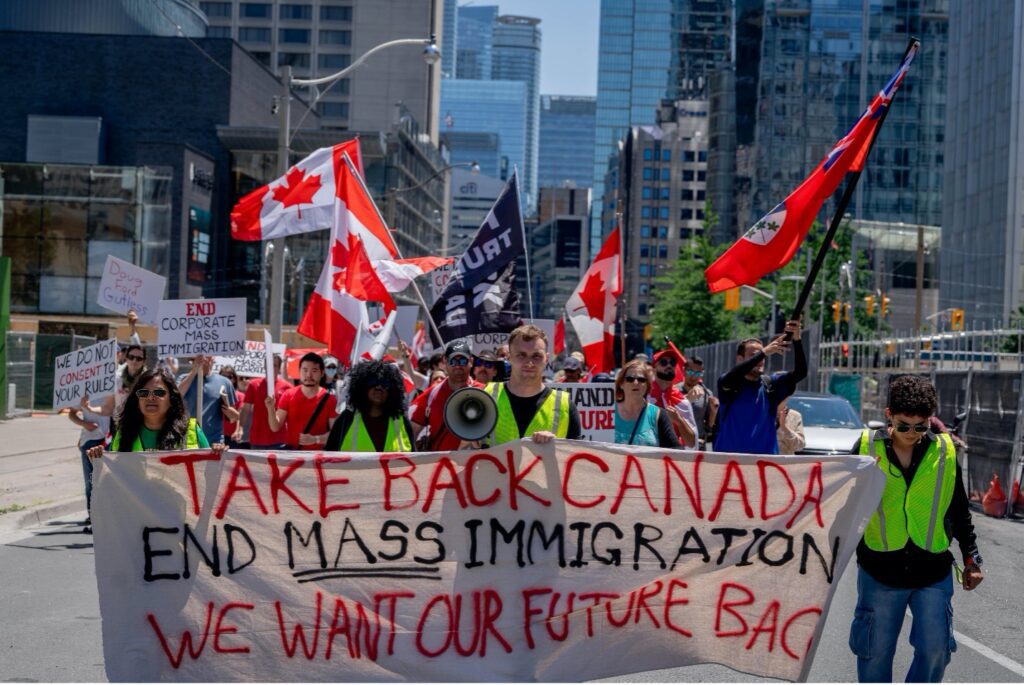NIMBY means Not In My Back Yard. It is often used in a derogatory sense for people who are opposed to a certain development because it would affect their own little neck of the woods. Instead of accepting a change affecting their neighbourhood for something that would presumably benefit the greater good, they selfishly oppose it just because they like things the way they are.
A lot of NIMBYism these days has to do with opposition to densification of neighbourhoods. Neighbourhoods that once consisted primarily of single-family homes are seeing these replaced with fourplexes and higher-storey buildings. Back yards are being severed from lots to add an additional housing structure. Woodlots within neighbourhoods are being developed. Residents of densifying neighbourhoods often find themselves with more neighbours and less nature. This push for densification results from a growing population.

In Canada, as in many Western countries with low birth rates, population growth is driven primarily by immigration. The Trudeau government has put an already high immigration intake into hyperdrive, with a target of half a million permanent residents by 2025. In 2022, Canada actually accepted over one million permanent and non-permanent residents. About half of all newcomers to Canada settle in Ontario, and of those, three-quarters move to the Greater Toronto Area (GTA). Trudeau’s irresponsible immigration policies have created a housing crisis across Canada that even rampant development can’t keep pace with. Small wonder that NIMBYism has grown along with government-imposed population growth.
Ontario premier empowers juggernaut of growth to run over democracy
Ontario Premier Doug Ford has grabbed the growth bull by the horns, not by questioning federal immigration policies, but by introducing bills that seem intended to make every square inch of Ontario available for development and to crush the very idea of resistance. His Bill 23, More Homes Built Faster, 2022 gives the Minister of Municipal Affairs and Housing the power to override municipal planning decisions and impose development. It also eliminates requirements for public meetings on certain planning matters, eliminating the ability of community members or groups to challenge development decisions. Conservation authorities would also be stripped of some of their traditional powers, including the ability to regulate or prohibit development that negatively impacts wetlands, rivers or streams. The potential impact of this bill is described by Ontario Nature.
Ford’s Bill 39, Better Municipal Governance Act amends previous Acts to give the mayors of Toronto and Ottawa and other “designated municipalities” the authority to propose by-laws to advance a prescribed provincial priority (such as housing) and requires city councils to pass the by-law if more than one-third of the members of the council vote in favour of it. Ford’s Strong Mayors, Building Homes Act Regulations support the amendments made to the Acts affected by Bill 39 (City of Toronto Act, 2006 and Municipal Act, 2001) that provide new powers to the designated mayors. These powers include the ability to appoint or dismiss the chief administrative officer or a chair or vice-chair of a local board, as well as greater veto powers. Ford is also moving ahead with building Highway 413, a four-to six-lane highway that would make an arc around the northwestern GTA.
Environmental groups push smart growth and YIMBY
Environmental groups push smart growth and YIMBY While Ford’s nature-busting program has angered environmental groups, it has not induced them to question the madness of continuous growth per se. Instead, they pretend that growth can continue as long as it is “smart growth” which will densify neighbourhoods and thereby contain the hundreds of thousands of new arrivals each year within prescribed urban boundaries. The environmentalists direct their anger at policies that allow sprawl and not at the growth policies that make it inevitable. No city that has grown upward has not also grown outward. The Utopian fantasy of smart growth has given rise to the concept of “YIMBY” or “Yes in my backyard.” YIMBY-adopters embrace the densification of their neighbourhoods for the sake of the environment and often social justice.
An organization calling itself Environmental Defence asks people to “fight sprawl by supporting the approval of more homes in your neighbourhood” and “demand that your municipal government end exclusionary zoning.” (Exclusionary zoning is zoning that prevents certain kinds of land uses, for example, zoning that allows only single-family homes.) Another organization called More Neighbours Toronto invites people to use its online tool to ask their MPP to end exclusionary zoning.
Even the Green Party embraces growth. Mike Schreiner, the Ontario Green Party leader, thinks the answer to the housing crisis arising from federal immigration policies is to end exclusionary zoning of single-family homes. He has introduced two private member’s bills, Bill 44 and Bill 45, to do just that. Taking a leaf from Premier Ford’s book, Schreiner’s bills “provide that there are no appeals.” The imperative of growth trumps people having any say in the future of their neighbourhoods. Just like the environmental groups, Schreiner has not said a word about putting the brakes on population growth by moderating immigration levels.
But YIMBY-embracers notwithstanding, do most people living in densifying neighbourhoods really want densification? The “no appeal” approach of Ford and Schreiner suggests otherwise. Our neighbourhoods are where we spend our lives when we’re not at work. They are where we decompress. And not everyone finds high-density living to their liking. A European study found that a high biodiversity in one’s neighbourhood was as important to life satisfaction as income, with an additional 10% increase in the number of bird species providing the same increase in satisfaction as a comparable increase in income.
Living in a neighbourhood with a bit of nature can therefore be seen as a form of wealth. As neighbourhoods densify, residents lose that wealth. City residents in general are also losers when a city densifies, as little nooks of natural areas get developed. Children may be deprived of a “great outdoors” to play in. In fact, immigration-driven growth and the densification that results seem to be driving residents of big cities to seek their happiness elsewhere. In 2022, when Canada’s population grew by a record one million, a record number of residents of the Greater Toronto Area “fled to another part of Ontario,” according to Better Dwelling. Presumably, they’ll have a bigger back yard in their new, smaller city or town.
YIMBYism is getting people to agree to their own impoverishment. It is a clever way to guilt people into saying Yes to development they never asked for. It is a ploy to make those who are losers in terms of what made their neighbourhoods attractive think they are winners, because they are making sacrifices for the public good. But YIMBYers are not making a sacrifice for the public good. They are making a sacrifice to the god of growth for the good of the profiteers of growth. While residents are losing their neighbourhoods-as-they-once-were to growth and almost always face higher property taxes to boot, speculators, developers, bankers, and some cheap-labour businesses are getting richer and are likely to live in houses with nice backyards.
NIMBY: Calling out the narrative on the benefits of forever-growth
People live in neighbourhoods with space precisely because they like having space. It contributes to their quality of life. The growth imposed by the federal government is detrimental to their well-being. There are no known health benefits to living in high-density areas and well-known adverse health consequences of the stress of crowding. A stable and eventually decreasing population would contribute to the quality of life of all Canadians – not to mention Canada’s ecosystems and wildlife.
To our great detriment, environmental groups and Green parties have been co opted into silence about the impact of growth. They promote densification as a “smart growth” solution although no city has grown upwards and not also sprawled. Environmental groups never ask whether there are not already enough high-rises in Toronto, Vancouver, and Montreal.
But that is precisely what NIMBYers are doing. When the juggernaut of government-promoted growth runs over their backyards literally or metaphorically, some of them have been voting with their feet to go elsewhere. But they can never really escape the growth monster. Growth will come to the little towns they have escaped to. Because the federal government imposes growth plans on the provinces, who in turn impose them on municipalities. And as Ontario strongman Doug Ford has shown, if it looks like current laws and regulations are an impediment to growth, those laws and regulations can be changed. And so for that matter can urban boundaries. Ford’s plans to build houses on the Golden Horseshoe greenbelt in the Greater Toronto Area shows that no “protection in perpetuity” can be guaranteed to stand up to growth.
With the forces of growth comfortably in bed with governments, and governments with globalists, and with environmental groups either complicit or afraid to speak out, “we the people” have little recourse but to go NIMBY. And that is exactly what we should do with whatever means at our disposal. Because why should the wealthy – the speculators, developers, bankers, cheap labour businesses and politicians imposing growth on the rest of us – be the only ones to be able to afford a place with a real backyard?
Madeline Weld, Ph.D.
President, Population Institute Canada
Tel: (613) 833-3668
Email: mail@populationinstitutecanada.ca
www.populationinstitutecanada.ca
Editor’s note: This article was originally published on Population Institute Canada’s website (populationinstitutecanada.ca) on May 17th, 2023. It is republished on Dominion Review with permission of the author.
All content on this website is copyrighted, and cannot be republished or reproduced without permission.
Share this article!




The truth does not fear investigation.
You can help support Dominion Review!
Dominion Review is entirely funded by readers. I am proud to publish hard-hitting columns and in-depth journalism with no paywall, no government grants, and no deference to political correctness and prevailing orthodoxies. If you appreciate this publication and want to help it grow and provide novel and dissenting perspectives to more Canadians, consider subscribing on Patreon for $5/month.
- Riley Donovan, editor